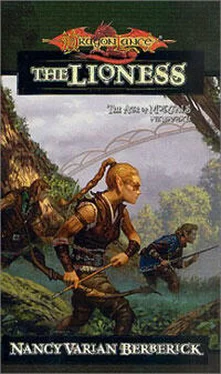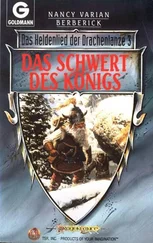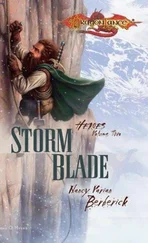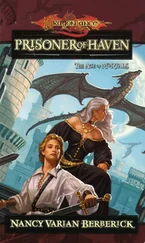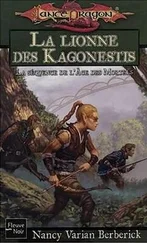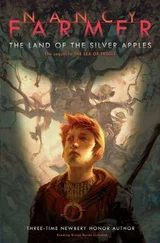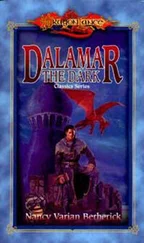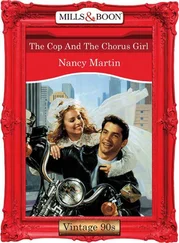All right, she thought, that’s a good sign.
She tried to stand and failed.
The dwarf who spoke of curses continued to speak. His fellows continued to listen, eight or more dwarfs bellied up to the bar. Other than those drinkers, the tavern was empty. It had the feel of a place just opened, the regulars perhaps having been waiting at the door, the rest of the night’s custom coming later.
“There’s big curses and minor ones,” said the dwarven expert, “the curse of your mother-in-law and the curse of an unchancy god.”
“No telling which of those is worse,” said an old dwarf at the end of the bar. His fellows laughed, and one said he reckoned he knew.
Kerian’s belly felt loose and dangerous, as though she might heave up the last fine meal she’d eaten, the pastries, wines, and thinly sliced fruit, the braised duck, the … She dared not think on that now. She tried to breathe slowly through her mouth and tasted the tang of metal, steel and slag. The odor of sweat drying on skin and wool stung her nose. Quietly, she groaned and wished she hadn’t, yet no one seemed to notice her there on the floor.
Where in the name of all lost gods am I? She glanced right, she glanced left, and out of the corner of her eye she saw a doorway into a brighter place where people—dwarves—walked by, some alone, others in pairs or groups. Their voices washed in through the door and washed out again as they passed by.
“Eh, there’s all kinds of curses,” the dwarf said, now with the air of one who had just done with his subject.
Kerian tried to stand again and failed again. Ah, gods, her head hurt!
The dwarfs listeners at the bar variously laughed, grumbled, or questioned, and one youngster opined that he supposed this was how the tavern got its name. “Because it’s cursed.”
“Nay,” said another, his voice tight with impatience. Kerian winced at the thud of something hitting wood, like a filled pitcher being set down heavily. “The tavern isn’t cursed. Can y’not read, lad? Or did they shoo you right off to shovel coal for the forges thinking you didn’t have the wit and a half needed for the skill and wouldn’t want it there anyway?”
The youngster closed his mouth, and Kerian drew a surprised breath. She knew the voice! She knew the speaker. She put one hand to the rush-covered floor and pushed herself to her feet, head still throbbing. A dwarf at the bar turned. He was not a handsome fellow. Illness had pocked the skin of his face, and his beard hung thinly from a slight chin and jaw. His eyes, set in pouches of flesh, went wide at the sight of an elf in the bar.
“By Reorx’s beard,” he said, “what’s an elf doing here?”
Nine dwarves turned from the bar. The youngster who’d mistaken the name of the tavern closed his fingers round the grip of the knife at his belt. “Ain’t no one lettin’ elves or anyone else in at the gates that I know about.”
Muttering ran around the bar.
Very carefully, Kerian said, “I’m looking for Stanach Hammerfell.”
No one seemed appeased; no one liked the idea of a sudden elf. One dwarf then another stood, and the youngster said, “Someone call the watch. No one knows how she got in here.” An inch of gleaming steel showed in the sheath at his belt, then a swiftness of blade.
Before Kerian could draw her own knife, a hard hand flashed out, a dwarf lurched over the bar and jerked the youngster so hard by the back of his shirt that he pulled him nearly off his feet.
“Idiot,” Stanach said. His blue-flecked black eyes glinted dangerously. “Do you know I saw that girl kill a Dark Knight with that selfsame little knife of hers?”
The young dwarfs face lost some color.
“Nay, y’could not know that, I suppose, but this you do know, idiot Kern: Y’don’t try to kill the customers in my bar, boy. It’s a house rule I get tired of explaining to you.” Growling, he roughed the boy, shaking him hard and shoving him away.
The curious stared at Kerian. They glanced at Stanach from the corners of their eyes, waiting to see what he’d do. Most of them, though, were clearly waiting for the tale of the Dark Knight’s death, for they did love tales, dwarves.
Stanach, however, was pleased to say nothing. He leaned his forearms on the bar, prepared to serve her silence until she spoke.
Kerian cocked her head. “You don’t seem pleased to see me, sir.”
Sir. The word murmured round the room. Sir, indeed!
“I wasn’t expecting you, missy.”
“What, then, Stanach? Are unexpected visits another prohibition in this bar of yours?”
Sly smiles replaced murmuring. Head throbbing, Kerian wavered again, and a strong hand slipped under her elbow. The gesture seemed to thaw Stanach who waved her to the bar and pointed to a stool.
“Sit. Y’look a bit wan.”
She nodded and accepted a tall mug of water. The others crowded close, and even Kern sidled up to see what could be seen. Stanach waved them off and would hear none of their grumbling.
“Go shout into the kitchen,” he said to Kern. “Tell whoever’s cooking in there to bring out food. Y’ve all done enough drinking on empty bellies for now. I’m not going to be hearing from the guard about the rowdies coming out of here again tonight.”
Kern did as he was bid, and when the hangers on at the bar migrated to tables in anticipation of food, Kerian found herself suddenly alone with the dwarf who had, a long time ago, given her a weapon and put her foot on an unexpected path. The last time she had seen Stanach Hammerfell, he’d been in company with two elves of the Queen Mother’s household. This dwarf, this Stanach Hammerfell who drank with elves in Laurana’s service, once claimed to be a trader and now seemed to be a barman—what was he? On the face of it, since she’d last seen him in company with Laurana’s own people, she would imagine him a friend.
Kerian dared not take that for granted.
“I didn’t think I’d ever see you again,” Stanach said. He took up a rag and wiped rings and spills from the polished wood of the bar, glossy golden oak. For this, his right hand had a use. The crooked fingers grasped a bar rag well enough.
“Never thought I’d see you again either,” Kerian said. She took a drink of water, her stomach settling, her head still aching. “I thought you were a trader. Have you found a new line of work now, Stanach? Keeper of a cursed bar?”
His mouth moved in a smile almost bitter. “I’m a man of many parts, girl.” He looked round the bar, at the patrons obviously his friends, at the rough paneled walls, the rushes thickly strewn on the floor. Spitoons gleamed, the brass polished brightly; on the walls torches flared in bronze cressets. “It’s a common misconception that the bar is cursed. It isn’t. The name of it is Stanach’s Curse. Different thing.”
“A different thing,” she said, agreeing. “The bar’s not cursed, you are.”
“Well, we’re not going to be all night talking about it.” His eyes grew hard, and when he leaned across the bar the hair rose prickling on the back of Kerian’s neck. “Now, tell me, missy, what are y’doing here?”
“Well, I—”
He lifted a finger, as though to a child. “Don’t be shaping lies now. We like order here in Thorbardin, and there is a guard comes by here regularly. It wouldn’t take but a shout to call them down.” Again the smile but this time very cold. “Everyone in this place had his back to the door a little bit ago. Everyone but me. I saw you come in.”
Her head pounded, and her hands shook. She wondered if she had failed in her mission not an hour into it. Kerian reached for the mug of water, but the dwarfs left hand closed over hers before she could lift it.
“Nay,” he said, “you’ll just spill it. Take a good breath, Mistress Kerianseray. Tell me your story.” When she hesitated he said, “Or tell it to the guard on the way to the dungeons. I don’t think you’ll like the dungeons of Thorbardin. We tend to forget about the people down there, and when we do remember, it’s not always in time.”
Читать дальше
